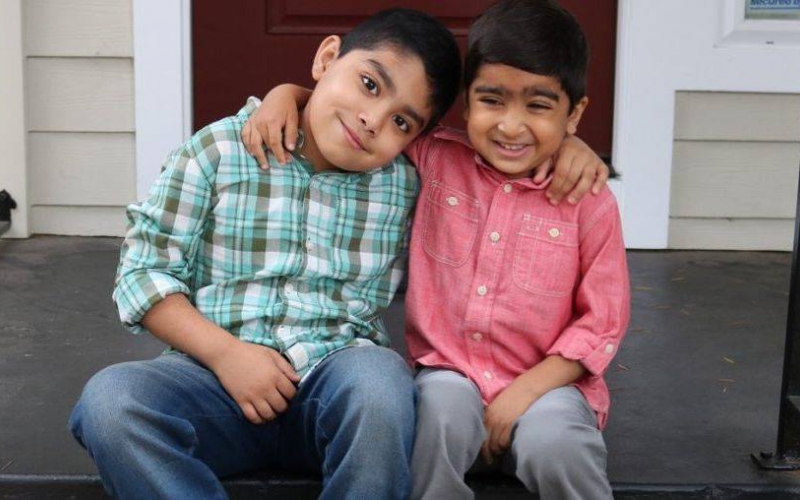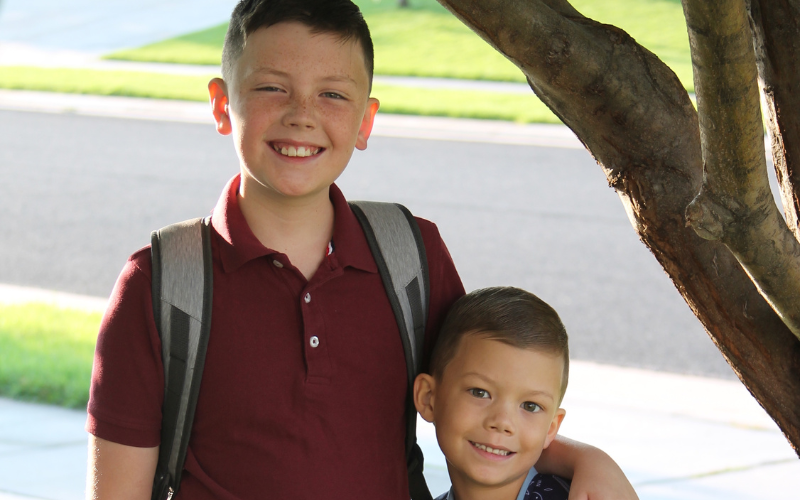by Trish Adkins
When then 4-year-old Ayaan’s big brother Kabir was diagnosed with leukemia, Ayaan’s entire routine shifted. His mother, Bhavika, and brother had to move away from home to be closer to the hospital—which was confusing for a 4-year-old who was used to having a brother around to play with.
“You lose a lot of attention for the non-diagnosed siblings and their life gets put on hold,” said Bhavika.
Ayaan, like other siblings of children with cancer, struggled with the sudden shift from normal life to cancer-life. Dr. Kristin Long, an ALSF grantee and pediatric psychologist from Boston University, says that a sibling’s cancer diagnosis can deeply disrupt a child’s sense of normalcy and predictability leading to feelings of being “invisible” or “forgotten.”
“Siblings experience their brother or sister’s cancer while they are growing up and learning to make sense of the world,” said Dr. Long, “This often leaves siblings feeling confused and overwhelmed.”
However, with support, siblings can learn to effectively confront and cope with strong emotions and those skills can have value throughout their lives. Dr. Long shared with us some ways to help children through a sibling’s cancer diagnosis:
1. Explain your child’s diagnosis to siblings using accurate but age-appropriate language.
When then 7-year-old Major’s sister, Peyton, was diagnosed with leukemia, the child life specialist at the hospital explained leukemia to Major by using fun names.
“The fighter cells were called ninja cells and the bad cells were called leukemia,” said Major’s mom Carrie. “Major could explain to his second grade class what leukemia is, how it is treated and what his sister was going through.”
Regardless of their age, siblings benefit from being kept in the loop about cancer-related information. Parents should be honest with siblings, while keeping the child’s age in mind. Dr. Long recommends asking your child’s treatment team for ideas about how to describe your child’s specific diagnosis and treatment regimen in simple terms.
2. Consider bringing siblings to clinic appointments.
When Kabir had to have his port accessed at the clinic, his brother Ayaan was there to distract him from the discomfort.
“He took being there for Kabir very seriously.” said Bhavika.
By bringing siblings to the clinic or to visit their brother or sister in the hospital, parents can help make the entire experience less of a mystery. It can be helpful for siblings to see, rather than avoid, the medical setting.
3. Ask siblings how they are feeling.
Dylan had his entire world shifted when his brother Ryan was diagnosed with leukemia.
“I think both of them have had to grow up way faster than they should have because of this,” said Jennifer, Dylan and Ryan’s mom.
Siblings will have mixed feelings—they may understand what is happening, but still feel frustrated or left out. They may be afraid. They may be angry. And they also may feel positive emotions—like compassion and family closeness. It is important to ask them how they are feeling.
While your child might not always respond to your questions, Dr. Long recommends asking as a way to communicate to your child that you care about their emotions. It also sends the message that it is okay to feel and talk about strong feelings—both good and bad.
4. Find community-based programs, like SuperSibs, for your child.
Children with cancer and their parents typically receive support in the hospital or clinical setting while they are in treatment. However, siblings are not there as often and therefore don’t have access or time with support staff, despite having their own complex needs.
Eleanor’s older brother, Thomas, was diagnosed with childhood cancer at the same time her mom gave birth to her younger brother. Her mom, Amber, had to move with Thomas and her infant son to be closer to treatment. Eleanor stayed at home with her dad.
Amber signed Eleanor up for SuperSibs, a program of ALSF. The program has provided Eleanor with invaluable support through regular mailings and online resources.
“When Eleanor gets a SuperSib letter, she thinks it’s the most awesome thing ever,” said Amber.
In addition, siblings can benefit from being enrolled in hospital based cancer-specific programs, attending oncology camps, and speaking with community or school-based psychologists or social workers.
5. Make special time with your child.
Childhood cancer often separates families—either by geography when parents are forced to travel for treatment or simply by interrupting and limiting normal family time. Find ways to make special time for your children—both alone and together as a family.
5-year-old Silas struggles when his brother, Toby, is too sick to play. His mother Elizabeth says that making time for special mother-son coffee dates or Home Depot trips with his Dad, helps Silas feel appreciated.
Even finding small amounts of time can have a positive impact on making siblings feeling special or included. When your family cannot be physically together, Dr. Long suggests utilizing FaceTime or Zoom to help siblings share in each other’s days.
6. Educate your friends and family network on the effects of cancer on a sibling.
It is important to gently remind friends and family members that siblings are affected by cancer, too. When loved ones ask how they can help—let them know they can send cards and gifts to siblings and be a listening ear and comfort to your child.
“It is helpful when people recognize that Anna is part of this journey, too. Not just by telling her, but many have included her when sending a gift or a treat to Isabella. The "things" are not what is important to her, but the gesture is important. Anna has been blessed to have supportive friends and family who recognize that this is not all about Isabella. They have loved her as well and made sure that she is supported,” said Leslie, mom to Anna and Isabella.
Looking for more resources for siblings affected by childhood cancer? SuperSibs, a program of Alex’s Lemonade Stand Foundation, is dedicated to comforting, encouraging and empowering siblings during their family’s battle against childhood cancer, so these children and teens can face the future with courage and hope.



